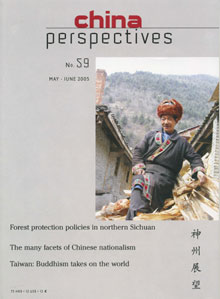
China Perspectives No. 59
- Special Feature
- Article
- Book Reviews
The Many Facets of Chinese Nationalism
Forest Protection Policies National guidelines and their local implementation in northern Sichuan
Energy in China: Development and Prospects
Since 1978, China's rapid economic development has brought about a growing demand for energy. The Chinese government has introduced a number of reform policies to attract investment, including foreign exchange reform, pricing reform, legal reform, and enterprise reform. To further improve the performance of the energy industries, the government has embarked on several programmes of industry restructuring in recent years. These programmes will have significant effects on the energy sector in the coming decades. This article reviews critical issues that pertain to the development of China's energy sector and assesses the sector's future.
Taiwan's Socially Engaged Buddhist Groups
A new religious phenomenon in Taiwan is the advent of socially engaged Buddhism, Buddhist groups committed to working for the betterment of society and the welfare of the poor and the ill. The growth of these groups has been concomitant with democratisation, membership increasing very rapidly in the 1990s so that self-identification with Buddhism has now reached 13% of the adult population. This article examines the roles undertaken by members of these groups in society and asks whether they are contributing to the growing civil society.
The Establishment of a Lay Clergy by the Modern Chan Society The practice of modern Chinese Buddhism
Founded in Taiwan in 1989, the Modern Chan Society was a community of lay Buddhists that challenged monks' religious privileges and put forward the idea of equality between monks and lay believers. It asserted an independent authority from that of the monasteries in managing salvation goods and accordingly recruited its own clergy. In tracing the history of the Modern Chan Society, this article assesses modern Chinese Buddhism: the role of the prophet in symbolic power, the conditions governing the emergence of a prophet, the legitimisation of religious reforms in modern practice and the paradox of institutionalisation.
Cong Cao, China's Scientific Elite
Hiroshi Sato, The Growth of Market Relations in Post-Reform Rural China. A micro-analysis of peasants, migrants and peasants entrepreneurs
Elspeth Thomson, The Chinese Coal Industry: An Economic History
Ann Heylen, Chronique du Toumet-Ortos. Looking through the lens of Joseph Van Oost, missionary in Inner Mongolia (1915-1921)
Thomas Sharping, Birth Control in China, 1949-2000. Population policy and demographic development


